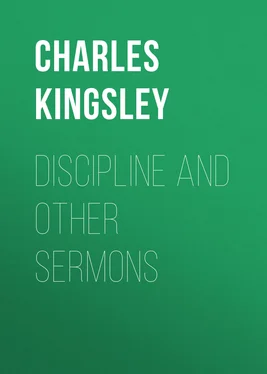Charles Kingsley - Discipline and Other Sermons
Здесь есть возможность читать онлайн «Charles Kingsley - Discipline and Other Sermons» — ознакомительный отрывок электронной книги совершенно бесплатно, а после прочтения отрывка купить полную версию. В некоторых случаях можно слушать аудио, скачать через торрент в формате fb2 и присутствует краткое содержание. Жанр: foreign_prose, foreign_religion, Философия, foreign_psychology, foreign_antique, на английском языке. Описание произведения, (предисловие) а так же отзывы посетителей доступны на портале библиотеки ЛибКат.
- Название:Discipline and Other Sermons
- Автор:
- Жанр:
- Год:неизвестен
- ISBN:нет данных
- Рейтинг книги:4 / 5. Голосов: 1
-
Избранное:Добавить в избранное
- Отзывы:
-
Ваша оценка:
- 80
- 1
- 2
- 3
- 4
- 5
Discipline and Other Sermons: краткое содержание, описание и аннотация
Предлагаем к чтению аннотацию, описание, краткое содержание или предисловие (зависит от того, что написал сам автор книги «Discipline and Other Sermons»). Если вы не нашли необходимую информацию о книге — напишите в комментариях, мы постараемся отыскать её.
Discipline and Other Sermons — читать онлайн ознакомительный отрывок
Ниже представлен текст книги, разбитый по страницам. Система сохранения места последней прочитанной страницы, позволяет с удобством читать онлайн бесплатно книгу «Discipline and Other Sermons», без необходимости каждый раз заново искать на чём Вы остановились. Поставьте закладку, и сможете в любой момент перейти на страницу, на которой закончили чтение.
Интервал:
Закладка:
No man ought to say that seamen have neglected science. It is the fashion among some to talk of sailors as superstitious. They must know very little about sailors, and must be very blind to broad facts, who speak thus of them as a class. Many sailors, doubtless, are superstitious. But I appeal to every master mariner here, whether the superstitious men are generally the religious and godly men; whether it is not generally the most reckless and profligate men of the crew who are most afraid of sailing on a Friday, and who give way to other silly fancies which I shall not mention in this sacred place. And I appeal, too, to public experience, whether many, I may say most, of those to whom seamanship and sea-science owes most, have not been God-fearing Christian men?
Be sure of this, that if seamen, as a class, had been superstitious, they would never have done for science what they have done. And what they have done, all the world knows. To seamen, and to men connected with the sea, what do we not owe, in geography, hydrography, meteorology, astronomy, natural history? At the present moment, the world owes them large improvements in dynamics, and in the new uses of steam and iron. It may be fairly said that the mariner has done more toward the knowledge of Nature than any other personage in the world, save the physician.
For seamen have been forced, by the nature of their calling, to be scientific men. From the very earliest ages in which the first canoe put out to sea, the mariner has been educated by the most practical of all schoolmasters, namely, danger. He has carried his life in his hand day and night; he has had to battle with the most formidable and the most seemingly capricious of the brute powers of nature; with storms, with ice, with currents, with unknown rocks and shoals, with the vicissitudes of climate, and the terrible and seemingly miraculous diseases which change of climate engenders. He has had to fight Nature; and to conquer her, if he could, by understanding her; by observing facts, and by facing facts. He dared not, like a scholar in his study, indulge in theories and fancies about how things ought to be. He had to find out how they really were. He dared not say, According to my theory of the universe this current ought to run in such a direction; he had to find out which way it did actually run, according to God’s method of the universe, lest it should run him ashore. Everywhere, I say, and all day long, the seaman has to observe facts and to use facts, unless he intends to be drowned; and therefore, so far from being a superstitious man, who refuses to inquire into facts, but puts vain dreams in their stead, the sailor is for the most part a very scientific-minded man: observant, patient, accurate, truthful; conquering Nature, as the great saying is, because he obeys her.
But if seamen have been forced to be scientific, they have been equally forced to be religious. They that go down to the sea in ships see both the works of the Lord, and also His wonders in the deep. They see God’s works, regular, orderly, the same year by year, voyage by voyage, and tide by tide; and they learn the laws of them, and are so far safe. But they also see God’s wonders—strange, sudden, astonishing dangers, which have, no doubt, their laws, but none which man has found out as yet. Over them they cannot reason and foretell; they can only pray and trust. With all their knowledge, they have still plenty of ignorance; and therefore, with all their science, they have still room for religion. Is there an old man in this church who has sailed the seas for many a year, who does not know that I speak truth? Are there not men here who have had things happen to them, for good and for evil, beyond all calculation? who have had good fortune of which they could only say, The glory be to God, for I had no share therein? or who have been saved, as by miracle, from dangers of which they could only say, It was of the Lord’s mercies that we were not swallowed up? who must, if they be honest men, as they are, say with the Psalmist, We cried unto the Lord in our trouble, and he delivered us out of our distress?
And this it is that I said at first, that no men were so fit as seamen to solve the question, where science ends and where religion begins; because no men’s calling depends so much on science and reason, and so much, at the same time, on Providence and God’s merciful will.
Therefore, when men say, as they will,—If this world is governed by fixed laws, and if we have no right to ask God to alter his laws for our sakes, then what use in prayer? I will answer,—Go to the seaman, and ask him what he thinks. The puzzle may seem very great to a comfortable landsman, sitting safe in his study at home; but it ought to be no puzzle at all to the master mariner in his cabin, with his chart and his Bible open before him, side by side. He ought to know well enough where reason stops and religion begins. He ought to know when to work, and when to pray. He ought to know the laws of the sea and of the sky. But he ought to know too how to pray, without asking God to alter those laws, as presumptuous and superstitious men are wont to do.
Take as an instance the commonest of all—a storm. We know that storms are not caused (as folk believed in old time) by evil spirits; that they are natural phenomena, obeying certain fixed laws; that they are necessary from time to time; that they are probably, on the whole, useful.
And we know two ways of facing a storm, one of which you may see too often among the boatmen of the Mediterranean—How a man shall say, I know nothing as to how, or why, or when, a storm should come; and I care not to know. If one falls on me, I will cry for help to the Panagia, or St. Nicholas, or some other saint, and perhaps they will still the storm by miracle. That is superstition, the child of ignorance and fear.
And you may have seen what comes of that temper of mind. How, when the storm comes, instead of order, you have confusion; instead of courage, cowardice; instead of a calm and manly faith, a miserable crying of every man to his own saint, while the vessel is left to herself to sink or swim.
But what is the temper of true religion, and of true science likewise? The seaman will say, I dare not pray that there may be no storm. I cannot presume to interfere with God’s government. If there ought to be a storm, there will be one: if not, there will be none. But I can forecast the signs of the weather; I can consult my barometer; I can judge, by the new lights of science, what course the storm will probably take; and I can do my best to avoid it.
But does that make religion needless? Does that make prayer useless? How so? The seaman may say, I dare not pray that the storm may not come. But there is no necessity that I should be found in its path. And I may pray, and I will pray, that God may so guide and govern my voyage, and all its little accidents, that I may pass it by. I know that I can forecast the storm somewhat; and if I do not try to do that, I am tempting God: but I may pray, I will pray, that my forecast may be correct. I will pray the Spirit of God, who gives man understanding, to give me a right judgment, a sound mind, and a calm heart, that I may make no mistake and neglect no precaution; and if I fail, and sink—God’s will be done. It is a good will to me and all my crew; and into the hands of the good God who has redeemed me, I commend my spirit, and their spirits likewise.
This much, therefore, we may say of prayer. We may always pray to be made better men. We may always pray to be made wiser men. These prayers will always be answered; for they are prayers for the very Spirit of God himself, from whom comes all goodness and all wisdom, and it can never be wrong to ask to be made right.
There are surely, too, evils so terrible, that when they threaten us—if God being our Father means anything,—if Christ being our example means anything—then we have a right to cry, like our Lord himself, ‘Father, if it be possible, let this cup pass from me:’ if we only add, like our Lord, ‘Nevertheless, not as I will, but as Thou wilt.’
Читать дальшеИнтервал:
Закладка:
Похожие книги на «Discipline and Other Sermons»
Представляем Вашему вниманию похожие книги на «Discipline and Other Sermons» списком для выбора. Мы отобрали схожую по названию и смыслу литературу в надежде предоставить читателям больше вариантов отыскать новые, интересные, ещё непрочитанные произведения.
Обсуждение, отзывы о книге «Discipline and Other Sermons» и просто собственные мнения читателей. Оставьте ваши комментарии, напишите, что Вы думаете о произведении, его смысле или главных героях. Укажите что конкретно понравилось, а что нет, и почему Вы так считаете.












